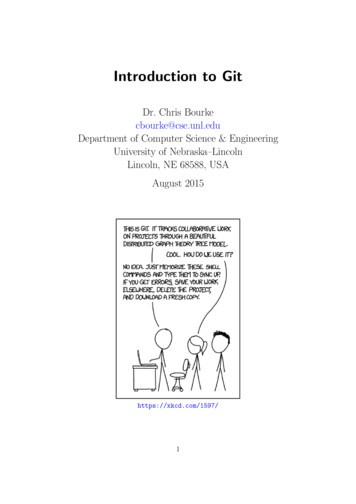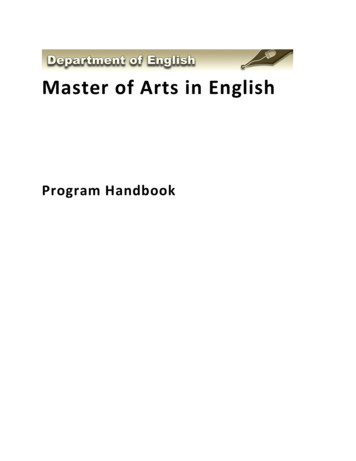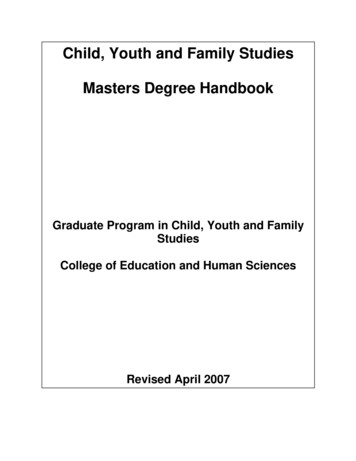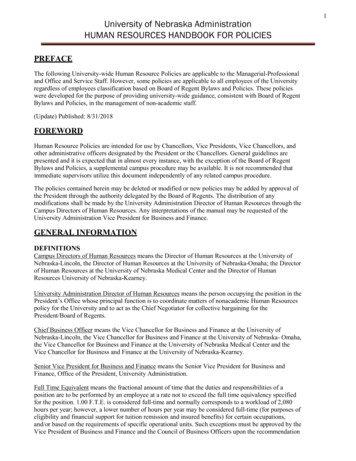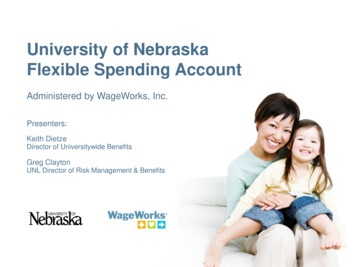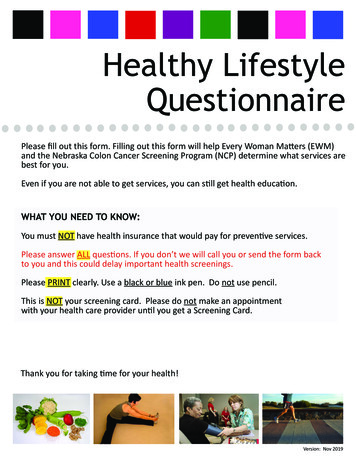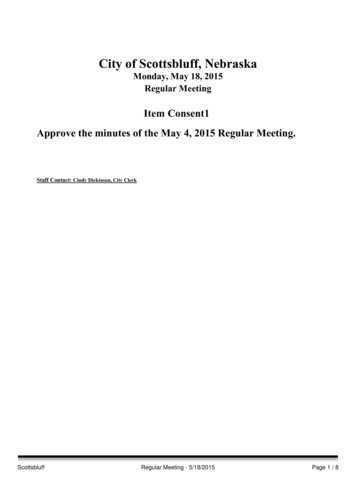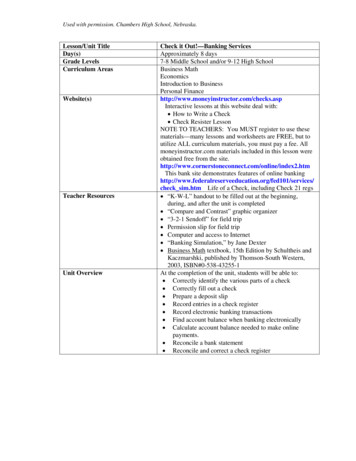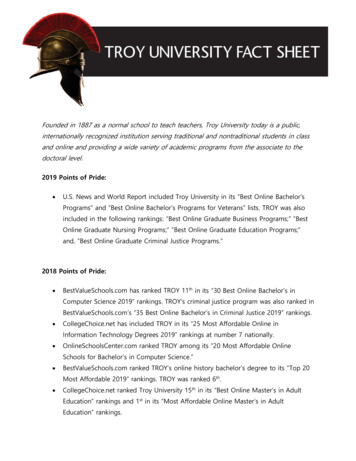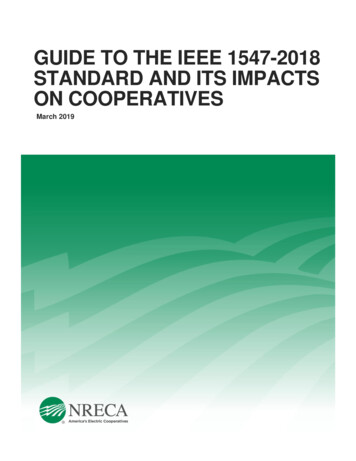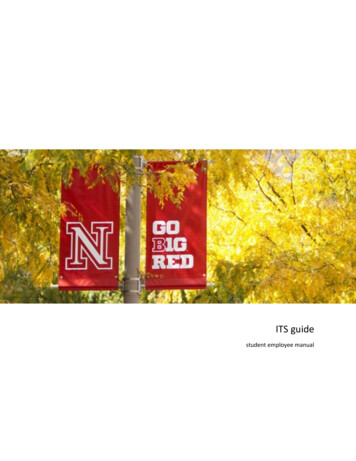
Transcription
ITS guidestudent employee manual
CONFIDENTIALITYAll of the information you have access to is to be considered confidential. Release of any confidentialinformation will be cause for immediate dismissal.WORK SCHEDULEIt is important to remember that student employees are “students” first and “employees” second.Therefore generally students are only scheduled for up to 20hrs/week. The following guidelines basedon residence status are shown below:Citizen & Non-Citizen: Work is not to exceed 29.5hrs/week while school is in session and when school isnot in session.* (We still encourage to only schedule these students 20hrs/week as we want to helpprioritize their studies.)Non-Resident Alien (F-1 or J-1): Work is not to exceed 20hrs/week while school is in session. Whileschool is not in session, work is not to exceed 29.5hrs/week.*Due to the new Affordability Health Care Act employers are required to provide healthcare foremployees working 30 or more hours per week. ITS will not finance healthcare for students.REQUESTING TIME OFFYou must receive approval from your Supervisor when requesting time off from work.HOLIDAY SCHEDULEStudent employees will not be required or allowed to work on holidays or when UNL is closed unlesspreviously approved by HR and/or they are working in an essential personnel area.REPORTING IN SICKIf you are ill and unable to work as scheduled, you are responsible for reporting your absence to yourSupervisor.TARDINESSYou must notify your Supervisor if you are going to be late to work. Student employees are expected toreport to work on time, as scheduled. Any tardiness problems will be documented and put in yourpermanent personnel file with ITS HR. Wage increases and performance reports may be affected.
TIMESHEETSITS uses an electronic timesheet accessed through Firefly. Instructions and Guidelines on completingTimesheets for Hourly Paid Student Employees can be found in Firefly. Once in Firefly click on the FireflyHelp tile and under Leave and Timesheets select ESS Time Entry for Students.As a Student Worker, you will enter Tmp/Std Work Hours. Be sure to enter your actual start and endtimes for each day. It is recommended that you enter and save your time daily; release your time afterthe week has been completed. Once time has been released, your time approver will receive a dailyreminder beginning the next morning until the time has been approved. IF YOU HAVE TIME SAVED butnot released, you will receive a reminder Friday morning you have time waiting to be released.For those with a Federal Work Study (FWS) Award: Please check with your supervisor on which costobject to choose and code your hours as Work Study Acad.Yr Hours. Once you have exhausted all ofyour FWS funds, ITS HR or your supervisor will notify you and instruct you on which cost object to use.Your time will them be entered as Tmp/Std Work Hours.If you have not entered any time on your timesheet for a week, you will not receive a reminder torelease the hours for approval, so it is in your interest to track time daily so you don’t forget. You willonly receive pay for hours that have been entered on your timesheet and approved by your timeapprover. If you do not enter time for a pay period, or your time is not approved before the payrollcutoff, you will not receive a paycheck until the next pay payday.DRESS CODEIn general, certain minimum standards of student employee dress, whether written or unwritten, arenecessary to present a professional environment for students, staff, and guests. A student employee’spersonal appearance is an extension of the University and Information Technology Services and reflectshow colleagues, staff, guests, students, and the community view the employing department or office.While Information Technology Services does not have a uniform dress code, it is up to the employingarea to communicate what constitutes appropriate dress. Business casual dress might be appropriatefor most departments on most days, but specific jobs and areas may warrant something more formal ormore casual depending on the situation.It is your responsibility to come dressed appropriately for work. If a Supervisor deems your clothinginappropriate for work, they will address this with you and you may be sent home to change intoappropriate clothing. In any case, the inappropriate clothing is not to be worn to work again.Personal hygiene is a must.Here are a few items of clothing to avoid wearing while at work: Torn, dirty, worn, frayed or sloppy clothingClothing with words, terms, or pictures that may be offensive to our customers or to otheremployees
Clothing considered extremely casual and not traditional business attire (examples: sweatpants,short shorts, flip flops, workout clothing, leggings, etc.)Exceptionally short skirts or shortsHats or head covers, unless they are required for religious purposes or to honor culturaltraditionsTattoos should be coveredShort crop tops (no bare midriff)It is understood student employees may not have funds to purchase new clothes to wear to work, butmodest, clean and appropriate clothing is generally expected. Being appropriately dressed indicates youare serious about the job and conveys a respect for the employing department’s policies andprocedures. Above all else, common sense should prevail.ADDENDUM TO DRESS CODEStudents who work in any of the ITS Huskertech areas or departments are required to wear theHuskertech polo shirt provided to them upon hire. It may be worn with an under shirt and if it’s a longsleeved under shirt, it must be a solid color of red, black, or white. The shirt must be tucked in and wornwith nice pants; jeans are okay as long as they are in good condition (not torn, dirty, worn, or frayed). AllHuskertech student workers are required to wear an approved name tag or badge while on the clock.PERFORMANCE EVALUATIONSThe performance evaluation is an opportunity for a student employee and the Supervisor to meet anddiscuss the students’ work performance. At minimum, a performance evaluation will done at least oncea year for student workers. The evaluation is the time to discuss the students’ performance strengthsand weaknesses, clarify job expectations, ask for feedback, make suggestions, and possibly reward thestudent worker for a job well done.EMPLOYEE’S PERSONAL RESPONSIBILITIESAfter arriving to work, you should become familiar with any information located in your mailbox, emailor posted information within your department. It is your responsibility to check and read your emailsperiodically during any shift you work.If it is necessary for you to leave your work area at any time, other than your break or lunch, theSupervisor on duty should know that you are leaving.If you obtain information that should be shared with the entire office, you should ensure that all staffknows this information either through verbal communication or through email.Questions that cannot be answered by you should be directed to the Supervisor.
If you share a desk area, you are expected to remove your personal items and straighten up yourworkstation so it is neat and ready for the next person to work there.In addition to the responsibilities listed above, you are expected to perform any additional duties thatmay be assigned to you by the Supervisor on duty.PERSONAL ELECTRONIC DEVICESThe use of personal devices (computers, tablets, iPad) while on the clock is not permitted. This includesthe use of any platform to access and engage in social media while on the job. Time spent on the jobshould be spent performing duties relating to your job. If you do not have enough job tasks to occupyyour shift, please contact your Supervisor.Please contact your Supervisor if you need to be excused from your shifts in order to study or submit arequest for someone to cover your shift.Violations of this policy will result in disciplinary action. The first violation will be a verbal warning, thesecond violation will be a written warning, and the third violation will result in termination.LUNCH AND BREAKSYou should coordinate any lunches and breaks with your Supervisor to insure adequate staffing.DRINKS AND FOODYou must clean up your area, and remove any food or trash from your work area and break room.SMOKINGBeginning January 1, 2018, the University of Nebraska-Lincoln will be smoke-free, tobacco-free andvapor free.SHREDDINGAny confidential documentation (i.e.: social security number, credit card info. etc.) generated byInformation Technology Services, whether it is to be scanned or not scanned, must be shredded beforeleaving the department.VISITORS IN THE WORK AREAIf you would like a visitor to tour the office, you are to make arrangements with your Supervisor.
CAMPUS WIDE EMERGENCY DECLARATIONIf the Chancellor or his/her representative declares a campus emergency, employees should contacttheir Supervisor immediately to see if their help is needed.MEDIA REQUESTSYou are never to give out information to the press regarding situations or events. Refer those calls to: ITS Main office (2-4242)Mark AskrenUniversity CommunicationsANGRY CUSTOMER POLICYIt is reasonable to believe that even the best service we provide may be inadequate for some callers.Although managing the emotions is the responsibility of each individual, we can play a part with callerswho are or become irate or express anger toward us on an incoming call. Empathize- Let the caller know you are sorry if you or another employee have made amistake or misspoke or even misunderstood their request.Proceed- Move on with the request and control the call. Callers may want to dwell on themistake or confusion; don’t let them.Interrupters- Some callers will dwell on an issue preventing you from accomplishing yourgoal. Give the caller three chances to provide you with the information you need to resolvethe issue or offer to have their call returned by a Supervisor. If after three they continue tointerrupt, announce you will be ending the call and terminate the call.Any threatening phone call should be reported to UNL-PD immediately.Document the call including the time and date of the call, what was said and how you ended the call andgive the information to your Supervisor.RECORDING CALLS (applies to UNL Operations Center & Client Services)We have the ability to record phone lines in areas such as the random monitoring of phoneconversations may increase in order to adequately measure quality assurance or resolve disputes incustomer dissatisfaction.
State law permits the University, on its business premises to “. . . intercept, disclose, or use thetransmission of a wire communication . . . to the rendition of [the University’s] service or to theprotection of the rights or property of the carrier or provider of such communication services.”The act of “recording” wire communications by definition in the statute says at section 86-701 (9)Intercept shall mean the aural or other acquisition of the contents or any wire, electronic, or oralcommunication through the use of any electronic, mechanical, or other device . . . Although generallyintercepting communications is illegal, both State and Federal statutes have exceptions foroperators. Nebraska requires the employer to let the employees know that they may be monitored, aslong as reasonable notice of the policy of random monitoring is provided to their employees. Using therecording for training purposes is OK. We will not be recording and keeping conversations merelybecause the technology has advanced to the point where we can.COMPUTER USE POLICYIt is the purpose of Executive Memorandum #16 at http://nebraska.edu to set forth the University'sadministrative policy and provide guidance relating to responsible use of the University's electronicinformation systems.The University of Nebraska strives to maintain access for its faculty, staff, students, administrators andRegents (the "users") to local, national and international sources of information and to provide anatmosphere that encourages sharing of knowledge, the creative process and collaborative efforts withinthe University's educational, research and public service missions. Access to electronic informationsystems at the University of Nebraska is a privilege, not a right, and must be treated as such by all usersof these systems. All users must act honestly and responsibly. Every user is responsible for the integrityof these information resources.All users must respect the rights of other computer users, respect the integrity of the physical facilitiesand controls, and respect all pertinent license and contractual agreements related to Universityinformation systems. All users shall act in accordance with these responsibilities, and the relevant local,state and federal laws and regulations. Failure to so conduct oneself in compliance with this Policy mayresult in denial of access to University information systems or other disciplinary action.UNIVERSITY VEHICLE POLICYOnly currently enrolled full or part-time students over 18 years of age who have been approved by UNLTransportation Services are allowed to drive University-owned or rented vehicles. In order to beapproved to drive, the Supervisor must:1. Submit the students first & last name, date of birth, drivers’ license number or a photo copy oftheir drivers’ license to ITS-HR.
2. Student must have a valid driver's license and a driving record free of any of the violations.Drivers are required to log their destination and mileage. A University-owned vehicle will never be usedfor personal reasons. For complete policy go to: rivers.NOTE: Any additions or changes to this document must be approved by Information Technology Services-Human Resources.
STUDENT EMPLOYEE MANUAL ACKNOWLEDGEMENTI have read and understand the ITS Student Employee Manual regarding the expectations as astudent worker within ITS. I understand that a violation of these expectations may subject meto possible corrective action up to and including termination. I acknowledge this signeddocument will be retained in my personnel file.Signature: Date:Student EmployeePrint Name:Signature: Date:ITS Student Supervisor or HR RepresentativePrint Name:
Beginning January 1, 2018, the University of Nebraska- Lincoln will be smoke-free, tobacco-free and vapor free. SHREDDING . Any confidential documentation (i.e.: social security number, credit card info. etc.) generated by Information Technology Services, whether it is to be scanned or not
